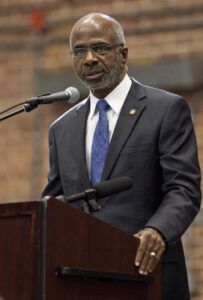Florida A&M University called on its “FAMUly” this Thursday and Friday to stand on the front lines for its students in the 1887 Strikes Day of Giving campaign, striking out against the financial hardships caused by COVID-19.
Powered by the FAMU National Alumni Association’s generosity, the campaign raised a total of $213,256.72 for student scholarships during this time of economic uncertainty.
Shawnta Friday-Stroud, the vice president of University Advancement and executive director of the FAMU Foundation, led the fundraising campaign. She said the campaign was developed long before COVID-19 and evolved intoa COVID-19 initiative as the need for technology became a prevalent issue for many students. Since Spring Break and the onset of remote learning for the rest of the semester, he university has due into its coffers to purchase laptops, aid in tuition costs and help students to travel back home for the summer.

“The funding is available to any student who demonstrates financial need, either to their dean, the housing office, or academic adviser,” Friday-Stroud said.
Donations began pouring in at 9 a.m. Thursday, as students, staff, faculty and alumni who hold the institution near and dear to their hearts began making contributions.
Dorris Hicks, a FAMU alumni who graduated from FAMU in 1967 with a bachelor’s and master’s in education, says she will always give back.
“I will always give to FAMU because FAMU gave me an opportunity to support and give back,” Hicks said.
While the nation has veered toward a depression over the past two months, analysts have said that the Black community will receive the brunt end of COVID-19’s economic impact. This economic gap may signal a pending disaster for the Black population.
NAACP Tallahassee branch president Adner Marcellin says that poverty and socioeconomic status go hand in hand with what much of the Black community Is experiencing right now This is partially due to the overrepresentation of African Americans in low-income jobs. The Black community is at a high risk during this time for being directly and indirectly affected by COVID-19, often being forced to choose between health and, many times, providing for their family.
“You see a lot of our workers providing the essential services in our food and hospitality industries,” Marcellinsaid.
Students at the university will be soon be eligible for another round of funding allocated by the federal Department of Education for emergency funding. The funds will be distributed in the form of a one-time payment to any student enrolled at the university who is able to demonstrate a need.